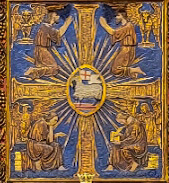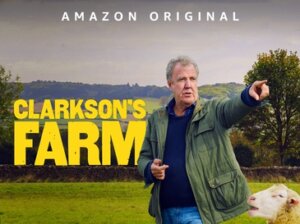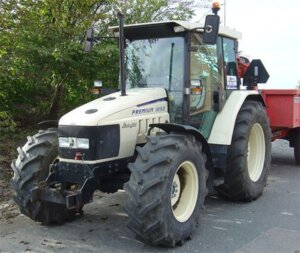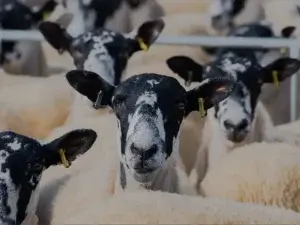
Diddly Squat Farm
I think I’ve shared with you before my guilty pleasure. Especially over these past months during my chemo treatments and recovering from surgery, I’ve leaned into this lazy, naughty treat: I just love television. I could claim that some of it is especially well-written, or has important social justice or theological themes. But the fact is that I’ve fallen in love with a reality TV show. None of you who has ever met me will be surprised to learn that my favorite reality TV show is not The Real Housewives of New Jersey. Nope.
 It’s a show built around British mega-TV personality and automotive enthusiast Jeremy Clarkson, who made his name in the UK as a broadcaster, journalist, writer, and game show host. Think Jay Leno with an English accent. The setup for this show — called Clarkson’s Farm — is that the local villager who had farmed Clarkson’s land since 2008, when Clarkson bought his 1,000-acre farm in the Cotswolds, is retiring. And Clarkson, who knows precisely nothing at all about agriculture or livestock, decides that he’ll farm it himself.
It’s a show built around British mega-TV personality and automotive enthusiast Jeremy Clarkson, who made his name in the UK as a broadcaster, journalist, writer, and game show host. Think Jay Leno with an English accent. The setup for this show — called Clarkson’s Farm — is that the local villager who had farmed Clarkson’s land since 2008, when Clarkson bought his 1,000-acre farm in the Cotswolds, is retiring. And Clarkson, who knows precisely nothing at all about agriculture or livestock, decides that he’ll farm it himself.
Clarkson was transitioning from other TV shows and had the crews and the contacts to put together what is truly great television, as well as a transformational story about what happens in community when people of different strengths, backgrounds, and perspectives work together to do something really good. If you’re not hooked yet, it’s because you haven’t quite gotten your mind around the comic power of Clarkson-the-motorhead’s insistence on buying a Lamborghini tractor — now who even knew that Lamborghini made tractors? — instead of a John Deere that he could actually figure out how to drive and that would fit into the sheds and storage bins on the farm where it needed to be used.
around the comic power of Clarkson-the-motorhead’s insistence on buying a Lamborghini tractor — now who even knew that Lamborghini made tractors? — instead of a John Deere that he could actually figure out how to drive and that would fit into the sheds and storage bins on the farm where it needed to be used.
Mowing Fields
Or, to round out this shaggy dog — or, if you will, shaggy sheep — story, Clarkson’s decision, facing the UK farm subsidy requirement that every field be mown once a year, to purchase a flock of sheep to do the job. He quickly finds that the sheep are really difficult to control, even with an electric fence and a barking drone made to sound like a sheep dog. There are many scenes of Clarkson the hapless shepherd following the sheep, helplessly calling them back as they jump over the fence and escape into the next field AGAIN. And then, after the joys and sorrows of lambing season and the monumental effort, equipment, and cost of wool shearing, Clarkson learns that each fleece is worth only about half a pound — a little over 50 cents US.
Good Shepherd Sunday
 Today is the Fourth Sunday of Easter, also known as Good Shepherd Sunday. The Good Shepherd — and the necessary attendant sheep — are a great metaphor for our community at Emmanuel because it makes clear that we all have a place in the story. Sometimes we’re shepherds, leading others through valleys and beside still waters, as we recited in the 23rd Psalm today. Shepherds have the necessary advance team skills to keep our community orderly and on track. And sometimes we’re sheep, happily munching clover and invasive weeds while growing wool for sweaters and gestating. Scripture gives us complex and nuanced metaphors to invite us to wonder — and to understand — that we each have an essential role in the community even as those roles may shift from time to time.
Today is the Fourth Sunday of Easter, also known as Good Shepherd Sunday. The Good Shepherd — and the necessary attendant sheep — are a great metaphor for our community at Emmanuel because it makes clear that we all have a place in the story. Sometimes we’re shepherds, leading others through valleys and beside still waters, as we recited in the 23rd Psalm today. Shepherds have the necessary advance team skills to keep our community orderly and on track. And sometimes we’re sheep, happily munching clover and invasive weeds while growing wool for sweaters and gestating. Scripture gives us complex and nuanced metaphors to invite us to wonder — and to understand — that we each have an essential role in the community even as those roles may shift from time to time.
Berkeley Divinity School Dean Andrew McGowan often says, When you’re wondering what a passage of scripture is about, you can be pretty sure it’s about you. So where do we find ourselves in the readings on this Good Shepherd Sunday? Dean McGowan also observed in an interesting blog entry earlier this week that Good Shepherd Sunday isn’t only about Jesus as our Good Shepherd and, as Handel’s Messiah puts it, All we like sheep.
All We Like Sheep
 Instead the sheep and shepherds in today’s readings create a spectrum of images with complicated interrelationships. Think of the words of the 23rd Psalm, which celebrates the shepherd who protects us and leads us beside still waters, but also spreads the table before us, where lamb or mutton is as likely as not to be featured on the dinner menu. Similarly, sheep both wander off on their own and need to be shepherded back into the fold and are vulnerable — even victims — lost to predators, to sacrifice, and to slaughter.
Instead the sheep and shepherds in today’s readings create a spectrum of images with complicated interrelationships. Think of the words of the 23rd Psalm, which celebrates the shepherd who protects us and leads us beside still waters, but also spreads the table before us, where lamb or mutton is as likely as not to be featured on the dinner menu. Similarly, sheep both wander off on their own and need to be shepherded back into the fold and are vulnerable — even victims — lost to predators, to sacrifice, and to slaughter.
And, while we can form idealized pastoral images of sheep following meekly behind their shepherd, the sheep of scripture were as difficult to manage as Jeremy Clarkson’s sheep, and without the 21st century tech hack of barking drones. It’s also important to remember that God is portrayed in scripture as both shepherd and sheep: The Lord is my shepherd, I shall not want. Jesus, Lamb of God, who takest away the sins of the world. The images are nuanced and complex, and that’s where theology happens. Our opportunity is to notice the tensions even within the individual readings, where our assumptions about sheep and shepherds are challenged, helping us to re-imagine those roles.
Author Jenna Smith observes that while we often think of pastoral shepherding as a one-on-one relationship, the Acts 2 image shows us that the fabric of the community, woven together in its functions, culture, practices, and environment, is itself a shepherd through its generosity, hospitality, worship, and togetherness. And that’s where I see us today. We’re like the hilarious and incredibly useful combination of different perspectives, backgrounds, strengths, and virtues that makes great TV on Clarkson’s Farm — from media personality Jeremy Clarkson, whose complete lack of experience in farming leaves his curiosity and imagination intact, to 21-year-old Kaleb the farm hand, who knows everything there is to know about agriculture and livestock but has never traveled beyond his home village. We’re all working together to figure this out.
While God has given me the privilege of being your pastor, during my illness this community has been my shepherd, caring for and protecting me. We are woven into the fabric of our community just like our prayers of hope and good intentions for each other and our community are woven into the altar cloth we’re using now in Eastertide. Jesus shows us both the gentle leadership of shepherds, and the vulnerability and shared experience of sheep, so that we can keep guiding each other into the fold of the community. Amen
